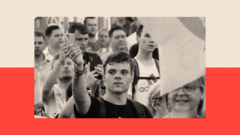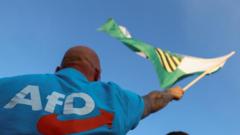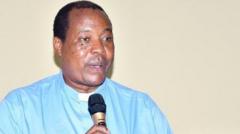The politics in Germany are witnessing a notable shift, particularly among young males, as an increasing number express support for the far-right AfD party. Factors such as immigration concerns, social media influence, and reactions to contemporary gender roles play a crucial role in this trend.
The Rising Allure of Far-Right Politics Among Young German Men

The Rising Allure of Far-Right Politics Among Young German Men
A growing number of young men in Germany are showing increasing support for the far-right Alternative für Deutschland (AfD) party, raising concerns about the shifting political landscape as national elections approach.
As Germany approaches its national election, an unsettling trend emerges from the cities, bars, and common hangouts: young men are increasingly aligning themselves with far-right political sentiments. In cities like Freiberg, Saxony, 19-year-old Nick articulates a desire for a safe and peaceful country, echoing a sentiment shared by many of his peers. Along with his friend Dominic, they express fears stemming from high-profile violence attributed to asylum seekers, a factor they cite as a major concern that fuels their support for Alternative für Deutschland (AfD).
Polling indicates that the AfD has polled second in national surveys in Germany for over 18 months, attracting a disproportionate number of young male supporters. A 2024 Pew Research report highlights that 26% of German men now harbor favorable views of the party, up from just 11% of women. Young voters under 24 demonstrated an increased preference for the AfD during the 2024 European Parliament elections, further signaling a shift in political alignment among the youth.
This phenomenon reflects a broader trend: a rising anxiety among young adults in Germany regarding immigrant integration and the perceived threats to societal norms and values. Many supporters of the AfD critique the traditional political left for focusing on women's rights and equality—a narrative that, according to experts like Dr. Rüdiger Maas, does not resonate well with younger men who often feel marginalized in discussions surrounding political correctness and gender roles.
Social media plays a crucial role in the AfD's appeal, especially platforms like TikTok, where the party finds significant traction. Its parliamentary account boasts a staggering following, greatly eclipsing that of traditional parties, providing a channel for disseminating messages that resonate with disenchanted male youth. Influencers such as Celina Brychcy, an AfD supporter with a considerable TikTok presence, embody this new media-led engagement. Brychcy promotes content reflecting traditional gender roles and border control, generally avoiding labels like “far-right” for fear of stigmatization.
The normalization of the AfD in everyday politics resonates with younger generations who grew up after Nazi Germany, making extremist views seem less radical and more palatable. This shift presents a stark contrast to earlier generations, as rising national pride and anti-immigration sentiment permeate youth discussions nationwide.
In classrooms, education professionals like history teacher Diana Schwitalla face the task of confronting troubling views among students, including trivializing Germany’s past. Young men, in particular, increasingly espouse traditional gender roles and express discomfort with modern discussions surrounding LGBTQ+ rights.
The AfD's increasing foothold indicates not merely a reactionary vote but a genuine belief in their platform as a transformative force for Germany. As traditional parties are challenged, experts predict the potential for a seismic shift in the political landscape, with far-right ideologies potentially defining the new right in Europe’s political theatre. The movement's insidious growth, particularly among the youth, raises pressing questions about the implications for social cohesion and democratic values in Germany.



















